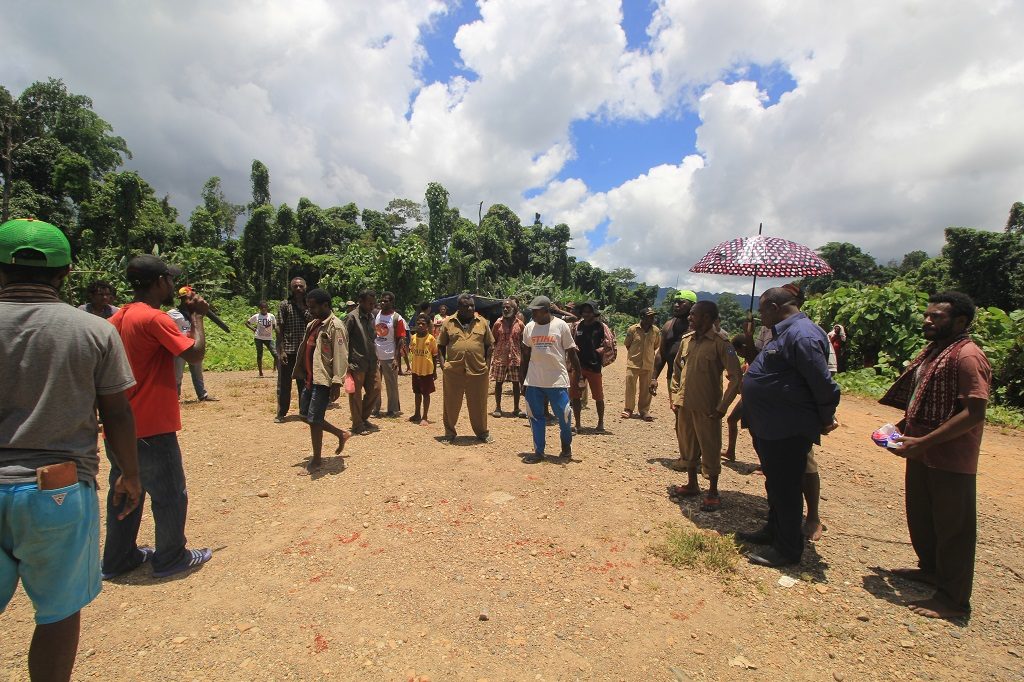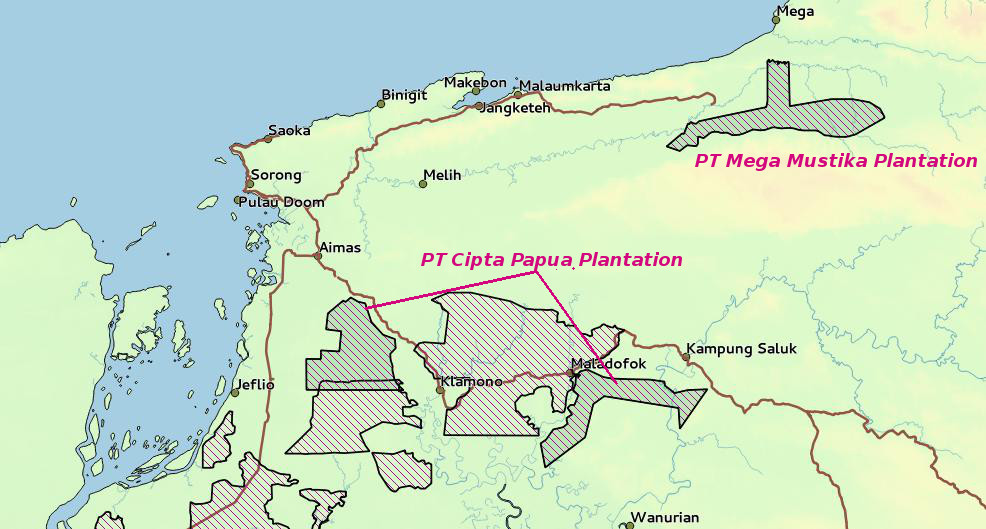 The sky was blue that morning and the sun’s intense heat would burn your skin. Hundreds of people from the Moi indigenous community in Sorong Regency, West Papua arrived at the crossroads at the entrance to the administrative centre of Klaso sub-district, blocking the street while they unfurled banners stating their opposition to oil palm expansion in their ancestral domain.
The sky was blue that morning and the sun’s intense heat would burn your skin. Hundreds of people from the Moi indigenous community in Sorong Regency, West Papua arrived at the crossroads at the entrance to the administrative centre of Klaso sub-district, blocking the street while they unfurled banners stating their opposition to oil palm expansion in their ancestral domain.
Moi people from three sub-districts in Sorong Regency took part in the road blockade on the morning of Wednesday 22nd March – Klaso, Saengkeduk and a new prospective sub-district Selekobo. It was timed to coincide with a meeting between the Sorong Regency government and oil palm operator PT Mega Mustika Plantation with the local community, which would take place in the administrative centre of Klaso sub-district.
PT Mega Mustika Plantation is one of several oil palm companies which has been issued permits by the local government. Bupati decree 66.1/127/2014 awarded the company a plantation business licence for 9,835 hectares, based on the location permit 221/2011 which had previously been issued on 23rd December 2011
According to Agus Kalalu, who is from the Moi ethnic group, this action to close the road was an expression of the people’s frustration, because none of their previous actions had been met with a meaningful response from the company or government.
“This is the fifth time that people from the three sub-districts have taken action”, Agus said.
The first action started in Saengkeduk village, and was followed by a second action in Klaben village in 2012. The third action was in front of the Sorong District Legislative Council building in 2016 and then most recently during a meeting with the Sorong Regency Forestry Agency in 2016.
David Ulimpa, a Moi indigenous community leader as well as being one of the customary landowners in Klaso sub-district, stated the reasons for opposition to the oil palm plantation in a speech, believing that it would have no effect on the community’s economic wellbeing. On the contrary it would bring hardship.
The people would not only lose their ancestral domain, they would also end up as labourers on their own traditional lands. He took as an example a case from Klamono sub-district, where PT Henrison Inti Persada, the company working in the area, has fired workers, local people, just because they were demanding their rights.
“In Malalilis village, Klayili sub-district in 2016, people who used to work in the plantation were fired by PT Henrison Inti Persada, just because they were demanding their right. The company terminated their contracts, but the land they were working on was their own ancestral land.” said David.
Not only that, last year two children of people who had been fired were detained at the Sorong Regency Police Headquarters just because they were making demands to the company about their parents’ rights.
Another reason, according to David, is that the land and forest belonging to the Moi indigenous community is not that vast, meaning that if a oil palm company were to come and take over the land, it would have an effect on their means of livelihood.
“Where would we look for food? We have always been very dependent on nature. For that reason, I’m standing on the Kalaso land, representing all the clans here, making a pledge in the name of God and the ancestors of the Malamoi land, that we will not accept oil palm companies in our area”, David made clear.
Mialim, a commnity leader from Saengkeduk sub-district, asked Lazarus Malagam, the third assistant regional secretary of Sorong Regency who was present at the meeting, to reveal immediately which clans had signed agreements with PT Mega Mustika Plantation.
“We have already expressed our opposition several times and I’m asking the third assistant regional secretary of the Sorong administration, Lazarus Malagam, to let this be the last time. We, the people of Saengkeduk sub-district are one hundred percent opposed to PT Mega Mustika Plantation.” Mialim added.
As a follow-up to the action, the people made a pledge in their traditional way, planting a certain sort of bamboo in the ground and praying that the people would never again accept oil palm companies in the Saengkeduk sub-district.
Unfortunately, the company representatives soon left the meeting without giving any response to the community’s protest.
“We are annoyed that the company went home, they really should have listened to what we want and witnessed the cutting of the bamboo to show we didn’t accept them.” Mialim said.
In response to the people’s demands. third assistant secretary Lazarus Malagam, stated that he would support the people’s wishes as long as there was unity and consistency between all the different clans.
“Don’t let it happen that everybody is in opposition today but then next year there are clans that suddenly turn around and accept. This can create social tensions, because people will surely think that one group could do this then why couldn’t another. But if we want to say no, then let’s all oppose together. If everyone is in opposition today, then let’s not let oil palm come into the same area in the future.
Rounding off the action, representatives of the indigenous communities in Klaso, Saengkeduk and Selekobo provisional sub-district handed over a statement of their opposition to the local government, as respresented by Lazarus Malagam.
“I will inform the leaders of Klaso and Saengkeduk sub-districts about the outcomes of the meetings and any related decisions in the near future”, Lazarus promised.
Distribution of the Moi ethnic group in Papua Barat.
According to the head of the everyday governing body of the Indigenous People’s Alliance of the Archipelago (AMAN) of the greater Sorong Region, Yusak Konstantinus Magablo, the whole of the Moi ancestral land comprises 400,000 hectares, of which only a small portion has been mapped through participatory mapping. “There are ten Moi sub-ethnic groups, which each have their own boundaries. This sub-ethnic groups are in turn divided into around one hundred large and small clans known as gelet“, Yusak explained.
The Moi sub-ethnic grups include Moi Kalasa, Moi Kalagedi, Moi Malamsimsa, Moi Amber, Moi Malayik, Moi Seget, Moi Kelim, Moi Walala, Moi Abun and Moi Malaibin, but only a few of these are widely known, mostly those in Sorong regency.
The Moi people can be found in almost all areas of Papua’s Bird’s Head Peninsula. In Raja Ampat, the Moi Mayya, were once considered a sub-group of the Moi people but are now their own ethnic group with several sub-groups and gelet.
The Moi ethnic group shares with other ethnic groups in Papua the special characteristic of forming gelet. A gelet could disappear if it becomes part of another ethnic group. Alternatively, other ethnic groups are open to becoming part of the Moi people.
One reason for this could be if they were ‘evicted by nature’ in the form of a natural disaster or other natural phonomena. Moi people have their own social structure, at the highest level are the indigenous leaders, comprised of the nedla, neliging (people who speak well), nefulus (historic people), ne kook (rich people) dan nefoos (holy people).
There are also traditional officials, such as usmas, tukang, finise or those who lead the affairs in the traditional buildings, tulukma, untlan (teachers at traditional schools called kambik), and kmaben.
At the lower level are the wiliwi, young males who have undergone traditional education in the Kambik and have had a traditional graduation ceremony. This group is being trained to become leaders and so they are taught the philosophy of leadership and thorough details of Moi customary laws and practices.
Source: Mongabay Indonesia http://www.mongabay.co.id/2017/03/29/tolak-perkebunan-sawit-masyarakat-adat-moi-palang-jalan/
[awasMIFEE notes on PT Mega Mustika Plantation.
PT Mega Mustika Plantation was given a location permit for 11475 hectares of oil palm plantation on 11th December 2011. We have a copy of the company records from that time, at which time the ownership structure was as follows: Joe Michael 5000 shares, Sudarsono Chandrawidjaja 10000 shares, Rusmina Sumpitan 10000 shares. Sudarsono Chandrawidjaja, who died in a bike race in 2015, was a well-known tae kwondo athelete, but also founded the Ciptana Group, which runs a plywood business in Semarang, central Java. Joe Michael presents angling programmes on Indonesian television and is the husband of pop singer Rita Effendy. The company’s managing director is Tommy Treider Jacobus, who was the Papua Police Chief from 2005 to 2007. We do not currently have up-to-date ownership information, which may have changed.
The same group has another concession in Sorong, PT Cipta Papua Plantation. That location permit was for 18,130 hectares and is split into two blocks, one just to the south east of the Sorong Regency Administrative centre in Aimas and one on mainly primary forest to the east of PT Henrison Inti Persada’s existing oil palm plantation. Another company, PT HCW Papua Plantation which had a concession in Bintuni, also appears to be part of the same group. The current status of that project is not clear.]

